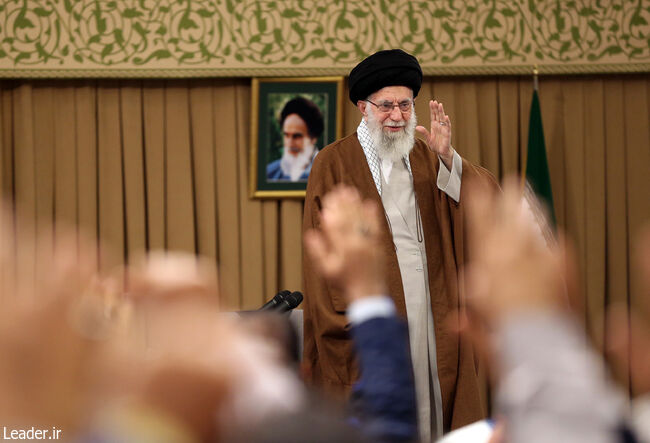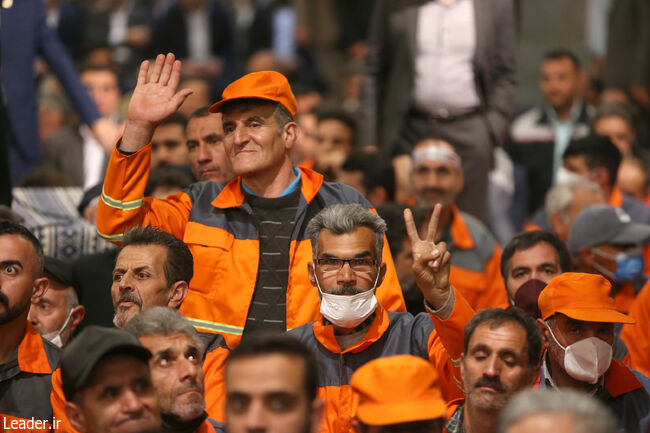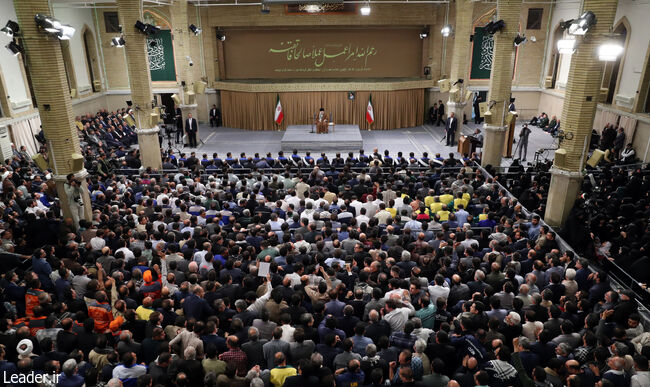In a meeting on the morning of the 24th of April, the Leader of the Islamic Revolution addressed thousands of workers. He emphasised the crucial role of the working class in advancing production and improving the country's economic situation. He also elaborated on the responsibilities of officials in solving the problems of the hardworking and noble labour force, saying, "The well-being of the working class will also improve the well-being of the nation." He also stated that the true purpose of America and the West in imposing sanctions and pressure on Iran was to render the Iranian nation and the Islamic system completely submissive and obedient. He said, "The great and firmly rooted Iranian nation and the Islamic Republic will not submit to coercion and excessive demands. We will have a bright future by turning sanctions into opportunities for progress and prosperity."
Expressing heartfelt gratitude for the working community's sincere efforts, integrity, and diligence, Ayatollah Khamenei regarded kissing the hands of the labourer as the highest form of respect for work and the worker. Referring to Prophet Muhammad (PBUH), he said, "Islam regards work and action as having intrinsic value and respect. Based on Quranic teachings and narrations, the effort of each individual to earn a lawful livelihood is considered as a righteous deed on the same level as worship."
He saw public attention to Islam's perspective on work and the worker as an essential necessity and a foundation for the country's progress. He said, "In the material world, workers are valued merely as a means of wealth production, but Islam considers the worker to have intrinsic worth due to its belief in the fundamental value of work. For this reason, the Prophet Muhammad (PBUH) said, " God loves whoever does their work correctly, skilfully, and well."
By citing recent years and focusing on sensitive economic issues, the Leader of the Revolution emphasised the importance of the economy. He stressed that a skilled and motivated worker is the pillar of the "leap in production." He said, "According to experts and commentators, realising this year's slogan requires the participation of the people. In this way, problems would diminish, and by strengthening the country's economy, workers would become wealthier.
He considered work and entrepreneurship as two frontline companions in fighting the economic warfare imposed by the enemies of the Iranian nation. He said, "These are two essential elements in the struggle against the United States: the harder the workers strive, and the more effective the conditions for their efforts become, the greater the success that the country and the nation will achieve."
Citing statistics, Ayatollah Khamenei said that the working class and their families comprise approximately half the country's population. He told officials, "If the condition of the working class improves, at least half of the people will be better off, and this is very important."
He held that ensuring job security was one of the most important duties that authorities and institutions have towards the working people. He said, "A worker who works with contentment and integrity must have confidence in keeping that job in the future."
The Leader of the Revolution talked about the closure of industrial units and even some occasional plant shutdowns. He said, "In the past one or two years, thanks to officials' efforts, thousands of closed or semi-closed workshops have been revived, and this important work must continue."
He also mentioned that insurance was important for working people and criticised the lack of implementation of general social security policies. He said, "These policies were announced long ago, and the President also ordered those regulations be drawn up, but in practice, things have not moved forward, and the policies have not been implemented."
The leader also discussed worker safety and improving vocational skills, which are other working class needs. He said, "Enhancing skills and expanding the knowledge in the workforce contributes to the country's progress and improvement of the quality of work, which benefits both workers and employers."
He also considered education very effective in helping skills development in the country. He said, "Schools, high schools, and universities can provide technical and vocational training alongside theoretical education and by issuing certificates of proficiency, they can easily help young people find suitable employment."
Another recommendation Ayatollah Imam Khamenei gave officials, employers, and entrepreneurs was that they should discover shining talent among workers and provide them with opportunities and an environment for innovation and creativity. After outlining the responsibilities of officials, the Leader addressed the duties of the working community. He emphasised issues such as honesty at work, performing tasks diligently and skillfully, discipline, and a sense of responsibility in the workplace. He said, "Dear workers, value your work because, through your work, the country prospers and gives honour, pride, and power to Iran."
He saw that transforming labour into a value in the minds of the public was a factor that increased the desire and enthusiasm for work. He said, "In this way, every worker becomes a valuable person in the eyes of the people, and young people would also play a role in improving production processes. Unfortunately, at the moment, some young people neither desire work nor seek it, and some consider only sitting behind a desk to work."
Concerning the slogan of the year, Ayatollah Khamenei pointed out that an essential duty for officials was identifying and explaining the reasons for people's participation in production, such as establishing cooperatives, assisting in homemade and handicraft production, supporting the establishment of knowledge-based companies, and strengthening agriculture and animal husbandry. He said: "Economic experts both inside and outside the government should show people various ways of participating in production, and officials should provide the support for and facilitate participation."
He considered bank credits essential to be directed essentially towards production and said, "This has not been done properly, and banking officials should pay attention and take action."
In another part of his speech, the Leader of the Revolution said that it was impossible to discuss economic issues without considering the unprecedented sanctions by the United States and Europe. He said, "The West makes false accusations such as the possession of nuclear weapons, human rights abuses, and support for terrorism as excuses for imposing sanctions upon Iran."
He mentioned the contradictions and false excuses of the West, and, citing Gaza as an example, he said, "According to them, the people under bombardment in Gaza are terrorists, but the evil, artificial, and ruthless Zionist regime which has massacred nearly 40,000 people, including thousands of children in six months is not considered terrorist."
Ayatollah Khamenei regarded the real aim of Iran's adversaries in imposing sanctions was to constrict the Islamic Republic to the extent that it would comply with colonialism and hegemony and surrender to their coercion. He said, "Some people, hopefully well-intentioned, constantly recommend acquiescing to some American demand to solve the problem while at the same time, American demands are never limited all."
Referring to a speech he had made several years ago on the nuclear issue when he had stated that Americans should specify the extent to which they will be satisfied with Iran's retreat on the nuclear issue, he said, "They are never willing to specify this limit because they aim to gradually advance and ultimately dismantle Iran's nuclear industry and gather the country's nuclear equipment as they did in that country in North Africa. This is what they want even when various sectors of the country, such as health, medicine, and other fields, rely on the products of nuclear activities."
The Leader of the Revolution once again emphasised that the main goal the Americans wanted from the sanctions was the complete political and economic obedience and submission of the Iranian nation and the Islamic Republic. He said, "They want Iran to be like some other countries, where Iran's wealth, prestige, and policies would be under America's control, but the Islamic system, Islamic integrity, and the great and firmly established nation of Iranian cannot possibly submit to their coercion."
He considered sanctions as causing harm to the country's economy and creating economic problems, but he added, "These very sanctions have led to the flourishing of talent and the emergence of domestic capacity."
Ayatollah Imam Khamenei saw turning the hatred of the enemy into an opportunity as a hallmark of a nation that is alive and said that this has been precisely the advice he has consistently given to the youth, officials, and the patriotic and religious people of the country.
He held that making advances in armament production was an example of turning sanctions into opportunities, adding, "This progress, demonstrated in a certain place, surprised all our enemies as to how Islamic Iran managed to produce this number of advanced weapons under sanctions."
The Leader of the Islamic Revolution added, "God willing, we will produce weapons more advanced than these. However, advancements are not limited to armaments alone; Iran is internationally prominent in areas such as medicine, health, and certain industrial and engineering sectors. However, we are lagging in some areas, but with determination and effort, we will also make progress in those areas."
They said that sanctions were becoming less effective and added, "Recently, a report from an international source said that Iran's gross domestic product had increased, which means that things are improving, and the country was progressing. We have not become exclusively reliant on external assistance, and sanctions have failed to bring Iran to its knees. This spirit should be strengthened in the country."
Ayatollah Imam Khamenei said that the pro-Palestinian protests and Palestinian and Hizbollah flag-waving on the streets of Europe and America were an acute embarrassment to those who themselves had accused the Islamic Republic of Iran of supporting terrorism under the pretext of supporting the oppressed in Gaza. He said, "Now, not only the Iranian people but all nations support Palestine."
He asked, "Is the Palestinian who stands up against the oppression of occupier settlers to take back his home a terrorist? Is the front of the oppressed that launches a resistance against tyranny and terrorists? Or aren't the terrorists those who bomb ordinary people and cause devastation? Most definitely, they haven't attained their goals and will never do so."
Summarising this part of his speech, he said, "It is evident to the Iranian nation that the reason for the oppressors’ hostility is not based on the lies they concoct. Their hostility is because Iran, as an independent nation, has not succumbed to their coercion and is not willing to follow their failed, backward, and unsuccessful policies. These policies are contrary to divine values and human nature, policies that, according to some Western analysts, are undermining America's 200-year-old credibility."
The Leader said that expecting the historically rooted and steadfast Iranian nation to comply with these failed policies is futile. He said, "The Iranian nation stands firm and resilient but must demonstrate its steadfastness in action, work, research, and national unity. In doing so, and by avoiding laziness and lethargy, it will find more opportunities and openings for progress amidst the difficulties and annoyances imposed by its adversaries. By Divine grace, the Iranian nation will reach a bright future."
At the beginning of this meeting, the Minister of Labour, Cooperatives, and Social Welfare, Mr Seyed Soltan Mortazavi, gave a report in which he mentioned that the unemployment rate had been reduced to 8.1 per cent and that the most important government accomplishment in the field of employment was the creation of one million jobs in 2023.
Mr Mortazavi addressed the development of universal insurance, the implementation of the electronic health record scheme with the participation of over 50 million people, regular pension payments without borrowing from banks, the provision of 160 trillion tomans worth of facilities to the production sector, and the establishment of around 300 workers' housing cooperatives across the country among the other highlights.



